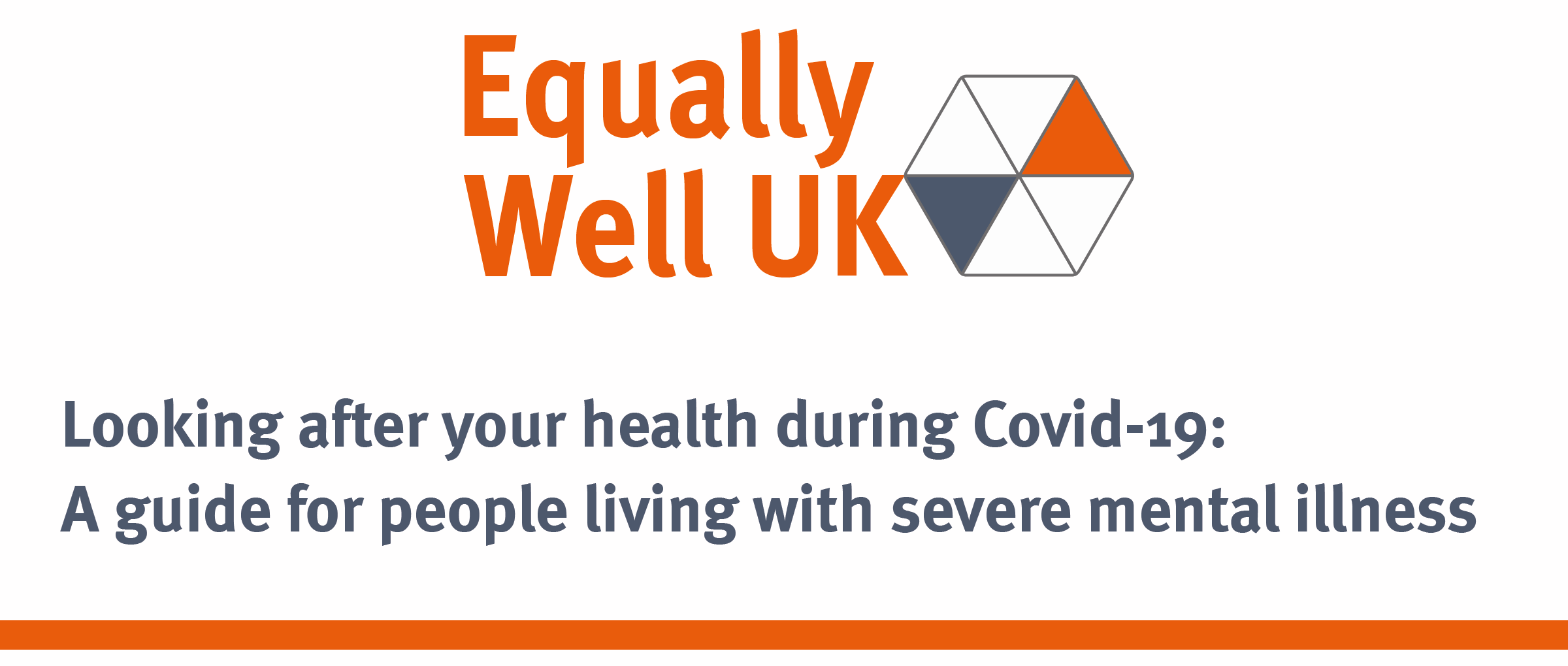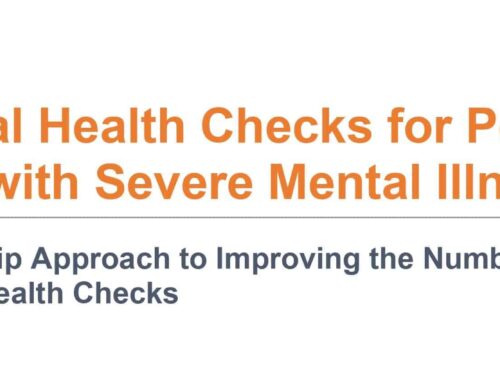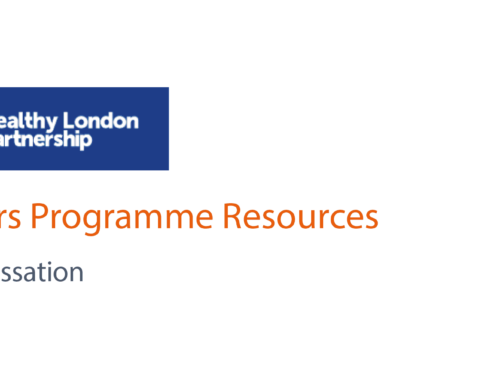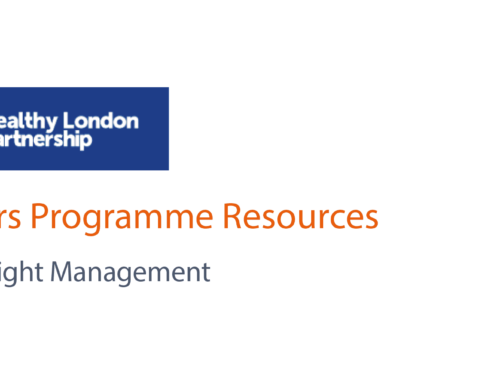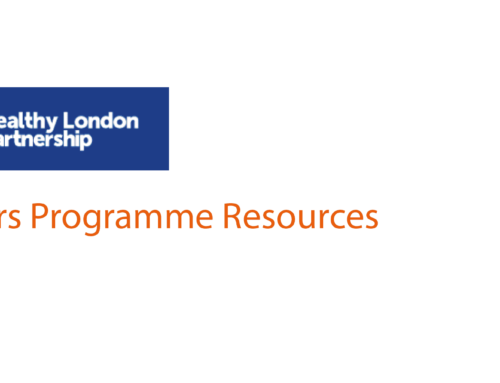Project Description
This is a short guide for people with severe mental illnesses on practical ways to protect and support physical health during this uncertain and unsettling time (please click on the project URL to the right of the screen to download the resource). We have worked with experts by experience and clinical professionals to create this resource, and we hope it will be helpful. We are grateful to NHS England/NHS Improvement for supporting Equally Well UK to produce this vital resource. Maintaining physical health is now much harder than before, but it has never been more important. Physical activity, stopping smoking and eating a healthy diet can help you feel better emotionally and mentally during this time. Likewise, looking after our mental health makes it a lot easier to take care of our physical health, visit Rethink Mental Illness for more on COVID-19 and mental health. For more information on COVID-19 visit the Government’s guidance. While COVID-19 is dominating our lives, it’s easy to neglect other health issues or to feel there isn’t help available. While physical health checks might be postponed or adapted, it is still critical that we all continue to address our wider health as usual, making use of resources, such as our GP surgeries and mental health teams to maintain and optimise our health. This guide is broken down into sections offering some practical ideas and sharing links to resources to help people living with a severe mental illness to look after their physical health within the constraints of the current situation. We have included some key ideas and tips based on existing research and our discussions with experts by experience and professionals.
Ideas and tips to help with a quit attempt
- Keeping a diary of how smoking and quitting are making you feel can provide an outlet for the many different emotions you may experience on the journey of quitting.
- Building a support network, for example with friends or family, can be helpful for some people, for instance, to help with motivation and to have someone to call if you are struggling.
- Keeping busy or starting a new hobby/skill will be important to distract yourself from cravings, which can be stronger if you are feeling bored.
- If you have a smoking relapse, think of it as a slip-up rather than a failure – it usually takes several attempts to quit for good.
- Speak with your GP or healthcare provider
- Some psychiatric medication will need to be reduced.
- Medication or nicotine replacement therapy on prescription to help you with your quit attempt.
We know that everyone’s experiences of quitting smoking are different, and what helps you will be unique to you.
Ideas and tips to help with healthy eating
- The NHS volunteer scheme can help with food shopping should you need it especially if you have run out of fresh or frozen fruit and vegetables
- Keep a balanced diet – limiting sugars and salt and making sure that we are getting enough nutrients
- Meal prep and batch cooking
- This could be a perfect time to start a hobby with cooking healthy meals, which could include warming vegetable soups or stews that can be batch cooked and frozen. Some people have shared how therapeutic they find cooking, finding new healthy nutritious recipes and meals
- If you have a carer, family member or friend who is able to help by cooking healthy meals that you can then freeze speak to them about the types of food you might like to try and if they’re able to make them for you
- Try to keep healthy snacks in the cupboard like nuts or fruit
- Avoid or try to limit your coffee and alcohol intake
- During the winter months and with the need to stay indoors it’s advised by the NHS to take vitamin D supplements with the recommended dose at 10 micrograms(400IU) a day.
Ideas and tips to help with keeping active
- Keep realistic expectations of how much exercise you can do, especially if you are new to exercising. Avoid setting unachievable goals which could make you feel disappointed.
- As it’s darker earlier in the evening, if possible try and get outside to exercise when its light.
- You could start with short bursts of exercise, perhaps 10 minutes each day and build up to longer if you feel able to. Think about seated exercises if you have mobility issues or have not worked out in a while.
- Don’t worry about not having special exercise equipment. For example, you could use household objects such as tin cans as weights or do step exercises on your stairs if you don’t have mobility issues. Also, many exercise videos do not need any equipment at all.
- Eat nutritious food so you have the energy you need to exercise and avoid exercising straight after meals.
- If you have access to a garden, gardening is great for physical and mental health. Indoors, looking after house plants may help bring you a sense of calm.
Ideas and tips to help with healthy weight management
- Creating a plan or schedule ahead of the day might help with healthy weight management, this could include meal plans or set mealtimes, activities or hobbies to help prevent eating through boredom as well as planning a physical activity that works for you
- Try to avoid comfort eating where possible, this could be managed by writing down how you are feeling and why and then planning how to manage the feelings. It might also help to talk it through with a friend or family member or focusing on a distraction like a film, book or another hobby.
- Drink plenty of water – it can be easy to forget to keep hydrated, some people find it helpful to have a large bottle of water as a reminder and a guide to how much water they have had in a day. Hot drinks such as herbal teas can also count towards your fluid intake for the day.
- Find a physical activity that works for you and set realistic goals, some days your main physical activity might be as simple as housework, gardening, climbing the stairs if you have them or going for a walk if able to.
Ideas and tips to help with medication and health management
- Check how much medication you have left to prevent running out
- Be very careful about buying medication online. You should only buy from registered pharmacies. You can check if a pharmacy is registered on the General Pharmaceutical Council website.
- If you’re worried about accessing medication, you can contact NHS 111 in England.
- If you’re in regular contact with mental health services (this might be with your support worker, PA, nurse, care worker, therapist, counsellor or befriender) ask about having appointments by phone, text or online.
- If you are planning to quit smoking, speak to your GP or health care provider as you may need to reduce your medication.
- Good quality sleep can make a big difference to our mental and physical health, some people find having a sleep schedule can help to improve sleep
Ideas and tips to help financial wellbeing
- Create a financial planner, if you are not able to speak to a trusted friend or family member about supporting you with this. Money and Mental Health advice also have a budgeting planner on their website.
- Speak to your utility providers e energy, gas or phone or any other outgoing payments, to see if they can help with differing or reducing payments or providing a better deal to reducing your outgoing costs, this can be crucial if you are on pay as you go and might need to go to top up your card.
- Check your benefit entitlements, find out if you are entitled to any additional benefits at this time. Money and Mental Health Advice provide information on benefits.
Ideas and tips to help when experiencing or recovering from Covid-19
- You may want to make an advance statement with your wishes and preferences should you become unwell and find it difficult to make decisions for yourself. While it isn’t legally binding, it tells health professionals how you would like to be treated. If you have a care coordinator or someone working with you regularly, they may have access to a local document template you could use. Bipolar UK also provides guidance on how to do this.
If you are worried about coronavirus, make sure you receive reliable information from the NHS or your GP as there are a number of myths around COVID-19. People with a severe mental illness will be eligible for the COVID-19 vaccination and will be notified by their local NHS service/GP surgery once it is available. You might also want to consider limiting the time you spend watching or listening to coverage about the outbreak including on social media.
Mental health support and crisis contacts
Maintaining physical health is also closely linked to mental health. It’s also more difficult to stay well mentally at this time, so taking steps to look after mental health is more important than ever. For more information from the Government about maintaining your mental health during COVID-19 visit their website. If you’re in crisis and need to speak to someone
- If you are in a crisis or immediate danger, please call 999
- Call NHS 111 (for when you need help but are not in immediate danger)
- Contact your GP and ask for an emergency appointment
- Contact the Samaritans who are available 24 hours a day, by phone (free for UK and Ireland) 116 123 or email jo@samaritans.org.
- For more advice and helplines please visit the Helpline Partnership.
Acknowledgements
We are grateful to NHS England/NHS Improvement for supporting Equally Well UK to produce this resource. This resource has involved engagement with members of the Equally Well Expert by Experience Group, Clinical Group and member organisations. The resource was created by Emma Bailey, Andy Bell, Androulla Harris and Alethea Joshi from Centre for Mental Health. We are grateful to all who shared their input and advice for this resource: Wendy Burn Clinical Group Chair, Jonathan Bickford Clinical Group member representing RCGP, Tim Coupland Clinical Group member representing RCN, Gabriella Hasham at Rethink Mental Illness, Kevin James Expert by Experience member, Barry Lloyd from Rethink Mental Illness, Marsha McAdam Expert by Experience member, Beth McGeever at NHSE/I, Jay Nairn at NHSE/I, Karen Peach Expert by Experience member, Emily Peckham from Closing the Gap, Vicky Salt from ASH, David Shiers Carer and GP.

